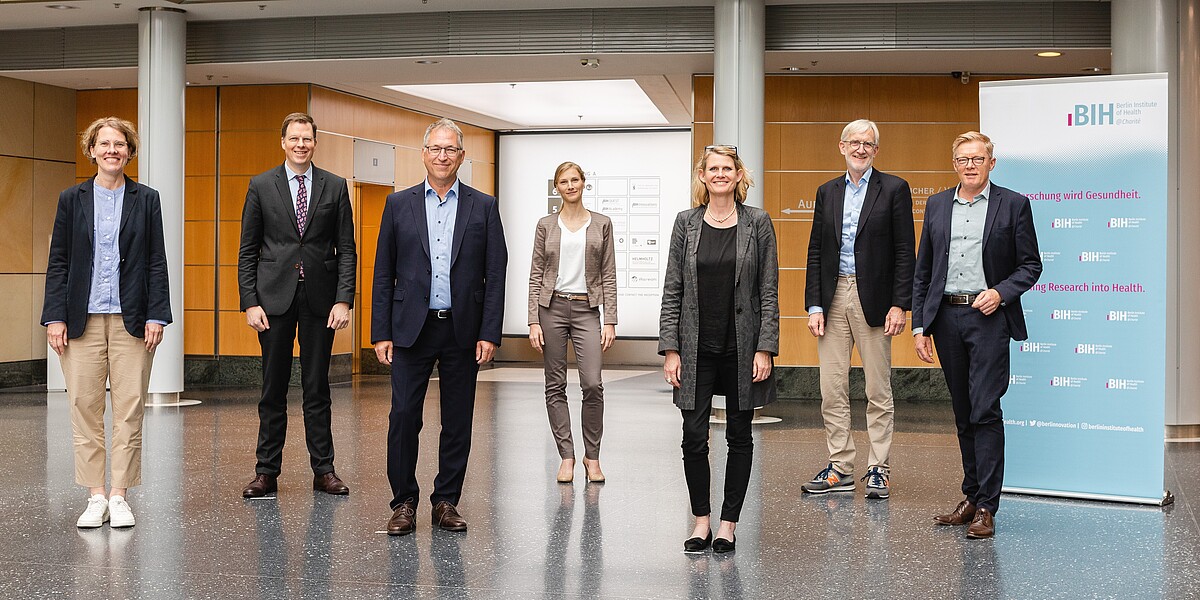Press release
State Secretary Judith Pirscher from the Federal Ministry of Education and Research (BMBF) visits the Berlin Institute of Health at Charité (BIH)

On Thursday, June 9, 2022, Judith Pirscher, State Secretary at the German Federal Ministry of Education and Research (BMBF), visited the Berlin Institute of Health at Charité (BIH). As the State Secretary responsible for life sciences and Chair of the BIH Governing Board, she gained an overview of the scientific work being carried out at the BIH.

“Transferring research into practice is of crucial importance,” said State Secretary Judith Pirscher. “Only in this way can we actually achieve progress in diagnosis and therapy and strengthen Germany’s position as a location for innovation. At the BIH, such a transfer into practice is made possible by the BIH’s integration into Charité – and is guided by the overriding principle of ‘Turning research into health.’ The BMBF supports this in order to ensure that patients benefit from new research findings as quickly as possible.”
Professor Christopher Baum, Scientific Director of the BIH and Chief Translational Research Officer of Charité, began by giving the visitor an introduction to the Institute, whose core mission is to advance translational medicine: “We turn research into health,” Baum said, paraphrasing the BIH’s motto. “This involves transferring research findings into clinical practice and vice versa, using clinical observations to develop new ideas for research projects.” So together with our partners, Charité – Universitätsmedizin Berlin and the Max Delbrück Center for Molecular Medicine in the Helmholtz Association (MDC), we are establishing a translational ecosystem in which translation is not only possible, but also fostered and guided scientifically.”
COVID-19 studies and single-cell methods
Professor Christof von Kalle, head of the joint Clinical Study Center of the BIH and Charité, provided the State Secretary with insights into the impressive wealth of different clinical and scientific COVID-19 studies conducted at the BIH and Charité. “Most studies at Charité were carried out on the initiative of scientists,” he reported. “For example, studies are investigating the mechanism by which the virus enters the brain, how the immune system is thrown off course, which cells the virus attacks, or why children usually suffer less severe symptoms than adults. Through this research, Charité and the BIH have made important contributions to understanding the SARS-CoV-2 virus and combating the COVID-19 disease. And the BIH has made a very significant contribution to building a large data and sample set on COVID-19.”
Dr. Stefanie Großwendt leads the BIH junior research group “From Cell Status to Function,” which conducts its work at the MDC’s Berlin Institute for Molecular Systems Biology (BIMSB). Three other junior research groups are also based at BIMSB, which was jointly established by the BIH, Charité and the MDC to promote breakthroughs in single-cell technologies. “My group is working to understand how cells communicate with each other,” explained the molecular biologist. “This is because cells are constantly exchanging information – during development, in healthy tissue, and in tumors. We want to decipher this interplay and understand the role it plays in determining whether cells undergo specialization or experience mutations.” By working with clinicians at Charité, the scientist aims to translate her research findings into practical applications.
From idea to spin-off
A successful example of technology transfer was presented by Professor Frederick Klauschen, Director of the Institute of Pathology at the Medical Faculty of Ludwig-Maximilian University Munich and co-founder of the diagnostics company AIgnostics. During his time at Charité, he developed a digital imaging analysis system that uses artificial intelligence (AI) to evaluate microscopic images. The BIH’s Digital Health Accelerator (DHA) Program supported the scientist in bringing the long-term research project to translational success. AIgnostics was founded in 2020, and the team now consists of more than 50 employees.
Finally, Christopher Baum presented a new project in the field of gene therapy. Recently, a memorandum was signed by Charité, the pharma group Bayer, and the State of Berlin in which they pledged a joint commitment to fostering the further development of this cutting-edge technology. “With our expertise, we can really make a strong contribution to this project,” explained Baum, who used to conduct his own gene therapy research. “Particularly for rare diseases, there is a serious medical need that is not yet being met by conventional therapies. Gene therapy represents a massive opportunity to get to the root causes of these diseases, which are usually the result of a single genetic defect, and at least be able to better treat them – if not cure them completely.”
